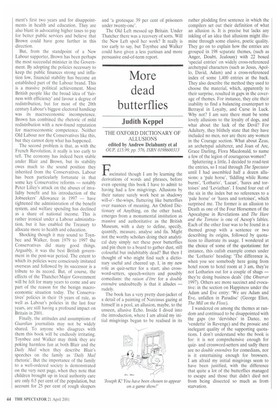More dead butterflies
Judith Keppel
THE OXFORD DICTIONARY OF ALLUSIONS edited by Andrew Delahunty et al OUP, £15.99, pp. 576, ISBN 0198600313 Fascinated though I am by learning the derivations of words and phrases, before even opening this book I have to admit to having had a few misgivings. Allusions by their nature surely work best as shadowy will-o'the-wisps, fluttering like butterflies over nuances of meaning. An Oxford Dictionary of Anything, on the other hand, emerges from a monumental institution as massive and authoritative as the British Museum, with a duty to define, specify, quantify, measure, analyse and fix. Might not the worthy scholars doing their analytical duty simply net these poor butterflies and pin them to a board to gather dust, still colourful but indubitably dead? But then I thought of who might find such a dictionary useful and cheered up. I, in my new role as quiz-setter for a start; also crossword-setters, speech-writers and possibly comedians: the raison d'être for a double entendre undoubtedly is that it alludes — rudely.
The book has a very pretty dust-jacket of a detail of a painting of Narcissus gazing at himself in a pool, an allusion, maybe, to the unseen, allusive Echo. Inside I dived into the introduction, where I am afraid my initial misgivings began to be realised in its
rather plodding first sentence in which the compilers set out their definition of what an allusion is. It is precise but lacks any inkling of an idea that allusions might illumine through some elusive, poetic quality. They go on to explain how the entries are grouped in 198 separate themes, (such as Anger, Doubt, Jealousy) with 22 boxed 'special entries' on widely cross-referenced archetypal characters (such as Jesus, Apollo, David, Adam) and a cross-referenced index of some 1,400 entries at the back. They also describe the method they used to choose the material, which, apparently to their surprise, resulted in gaps in the coverage of themes. For instance, they cite their inability to find a balancing counterpart to Betrayal in Loyalty, and Curse in Luck. Why not? I am sure there must be some lovely allusions to the loyalty of dogs, and what about the luck of the Devil? For Adultery, they blithely state that they have included no men, nor are there any women in the Courage section. What about Zeus, an archetypal adulterer, and Joan of Arc, Grace Darling, Flora Macdonald, to name a few of the legion of courageous women?
Spluttering a little, I decided to road-test the entries, so I read through The Spectator until I had assembled half a dozen allusions: a 'pale horse', 'fiddling while Rome burns', `Lothario', `Lucan', 'hares and tortoises' and 'Leviathan'. I found four out of the six in the index but no references to a 'pale horse' or 'hares and tortoises', which surprised me. The former is an allusion to Death as one of the Four Horsemen of the Apocalypse in Revelations and The Hare and the Tortoise is one of Aesop's fables. Each of the other four was to be found in a themed group with a sentence or two describing its origins, followed by quotations to illustrate its usage. I wondered at the choice of some of the quotations: for instance, this oafish example comes under the tothario' heading: 'The difference is, when you see somebody here going from hotel room to hotel room at 3 am, they're not Lotharios out for a couple of shags — they're doing business deals' (the Observer 1997). Others are more succinct and evocative: in the section on Happiness under the Adam and Eve entry: 'We are Adam and Eve, unfallen in Paradise' (George Eliot, The Mill on the Floss).
I wandered on among the themes at random and continued to be disappointed with the gaps (no 'dervishes' in Dance, no 'vendetta' in Revenge) and the prosaic and inelegant quality of the supporting quotations. I don't understand who the book is for: it is not comprehensive enough for quizand crossword-setters and sadly there are no double entendres for comedians, nor is it entertaining enough for browsers. I am afraid my initial misgivings seem to have been justified, with the difference that quite a lot of the butterflies managed to escape and those that didn't died not from being dissected so much as from starvation.


































































 Previous page
Previous page